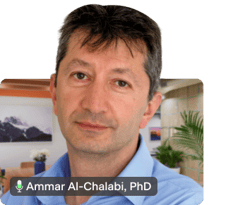Webinar recap: International perspectives on genetic testing in ALS

This webinar, hosted by Paul Wicks and featuring a panel of experts in ALS and genetics, focuses on the challenges and variability in genetic testing and counselling for ALS. The experts highlight that while genetic testing is a critical component of ALS research and treatment, key challenges include making the test available to everyone who needs it and ensuring consistency among tests.
The link to the full webinar is here; a brief summary is below for easy reference.
About the speakers
Ammar Al-Chalabi, PhD
Ammar Al-Chalabi, PhD is a consultant neurologist at King's College Hospital. He is an expert in the field of ALS and has contributed to numerous publications on the topic.

Kristiana Salmon
Kristiana Salmon is the Director of Clinical Operations at QurAlis, a company working towards developing precision medicines for ALS. With 20 years of experience in the field, she has been involved in improving access to genetic testing for people living with ALS in Canada.

Patrick Short, PhD
Patrick Short, PhD is the Co-founder and CEO of Sano Genetics, a company that provides tools to accelerate research and support companies in clinical trial patient recruitment for precision medicine research.
Paul Wicks
Paul Wicks is a consultant to clinical research and digital therapeutics companies, including Sano Genetics, Ada Health, and Woebot Health. Paul spent 10+ years at PatientsLikeMe, starting in R&D and finishing his time as VP of Innovation.
Highlights from the webinar
What are some of the challenges related to genetic testing for ALS?
Understanding the genetic basis of ALS is critical for all of humanity to attack the disease as one united effort, but unfortunately, access to genetic testing is not consistent worldwide. Where it is available, it is often concentrated in Western, educated, industrialised, rich, and democratic countries. Inconsistencies in testing can result in a misdiagnosis, which could have serious consequences.
It’s also important to identify who will benefit from genetic testing, and what types of genes are being tested for in different populations. The incidence of certain mutations in ALS varies globally, so we need to think about how to make sure there is access to broad panels globally to address this.
What is the role in genetic counselling in an ALS diagnosis?
The need for more research and guidelines to improve access to genetic testing and counselling for ALS is clear; the panelists in this webinar recommend the implementation of joint programs where the data generated is used in both clinical decision-making and in research. They also stress the need for early adopters and enthusiastic clinicians to drive the conversation about genetic testing and counselling forward.
Genetic testing and counselling for ALS are critical to accelerating precision medicine research and treatment. The panelists emphasise that it is essential to work towards making genetic testing and counselling available to everyone who needs it, regardless of their location or ethnicity.
Summary
This webinar provides expert insights into the difficulties of genetic testing and counselling for ALS. It highlighted the need for more research, guidelines, and collaborations to improve access to genetic testing and counselling, and identified the key players who need to continue driving the conversation forward are early adopters and supportive clinicians. The situation is not unique to ALS – other diseases, such as breast cancer, face similar challenges. It’s critical that we learn from these other conditions in order to drive research forward.


